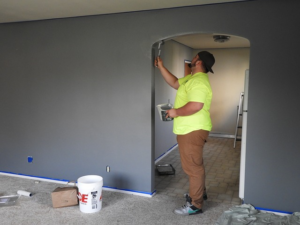
Whether you are considering joining, or already serving in the U.S. Army and looking to find a place to live, there are some benefits that are provided to members of the armed forces, including the option to live off-base. But this privilege is not afforded to all soldiers, as it depends on the rank of the soldier, whether the soldier is married and whether on-base housing is available. Having reasonable knowledge of what you can do based off your rank and base policies should help soldiers make informed decisions.
General Guidelines for Living Off-Base
The determination of living on base or off in the Army mostly depends on rank and marital status. In general, junior enlisted soldiers (E-1 to E-4) must live in barracks on base. That being said, there will be exemptions, depending on your particular situation, like family status or shortages in on-base housing.
Unlike for enlisted ranks, where every day is a new hustle to seek a roof over your head, non-commissioned officers (NCOs) and higher-ups have more options around whether or not they live off-base. Typically, Soldiers E-5 (Sergeant) and above are allowed to live off base, contingent upon approval and housing allowances. Officers (O-1 through O-10) are commonly allowed to live off base as well.
Living Off-Base by Rank
1. Soldiers (E-1 to E-4)
Private to Specialist (E-1 to E-4): are normally required to live in barracks unless married or with dependents. The Army focuses on unit cohesion and discipline for junior enlisted soldiers, which is why they are usually free to remain behind the wire.
There’s a catch, though there are exceptions for E-4 soldiers assigned with enough time in service (usually four or more years) to get off-base housing off-base if on-base housing is not available. Unit commander discretion applies, and approval is subject to local policy and available housing.
2. E-5 and Above: Non-Commissioned Officers (NCOs)
E-5 and above sergeants have usually had the opportunity to live off-base and are provided Basic Allowance for Housing (BAH). This is a significant step in a enlisted career, as it gives more autonomy and accountability. The decision is up to the unit and installation policies, but in general, an E-5 is eligible to live off base, if approved by their command.
Staff Sergeants (E-6) and higher-ranking NCOs have even greater flexibility when it comes to off-base housing. Because of their rank and level of responsibility, they often qualify for it even without special approval beyond normal procedures.
3. Warrant Officers (WO1 and Above)
Warrant Officers (WO) (starting out as Warrant Officer 1 [WO1]) are also classified as subject matter experts in the field. Most of them get BAH included in their pay so they have the option of living off-base.
4. O-1 and Above: Commissioned Officers
Most Commissioned Officers (Second Lieutenant and above) do not have to live on-base. And they’re offered the option of living off-base and taking home BAH, allowing them to secure appropriate housing off of the base in the surrounding community.
Basic Allowance for Housing (BAH)
The Basic Allowance for Housing (BAH) is a subvention to soldiers rent, when they live off-base. The amount a soldier receives of BAH depends on their rank, their location, and their dependency status (with or without dependents). BAH rates differ annually based on market conditions and are higher in regions with high costs of living.
To be entitled for BAH, soldiers must wait to move off-base. Those who are eligible usually include:
- All married soldiers, irrespective of rank
- Single service members in the grade E-5 and above
- Soldiers with dependents
- Soldiers given special approval because of housing shortages
Considerations That Could Impact Living Off-Base
- Marital Status: Usually allows married soldiers of all ranks to live off post and receive BAH.
- Dependents: Soldiers in a relationship with a legal dependent (spouse, children, or legal dependent) are eligible for off-base housing assistance.
- Housing Availability: Lower-ranking soldiers may be allowed to live off-base if barracks or on-base housing is available.
- Deployment Status: Certain soldiers serving in high-deployment areas may be strongly encouraged to reside on base to expedite deployment.
- Unit Command Decision: Even with promotion eligibility there is still a unit command decision.
Also, the pros and cons of living off-base
Pros:
- More Privacy and Freedom: The off-base life bestows more autonomy and space than an on-base barracks.
- Family Benefits: Soldier with dependents can make sure their families have a secure lifestyle.
- Much more housing options: Soldiers have the opportunity to choose the housing type that meets their preferences and financial requirements in the community.
- More Relaxed Rules: Barracks features strict rules when you’re on-base, and you have more freedom when you live off-base.
Cons:
- Extra Bills: Soldiers who live off-base need to pay for utilities, rent and other housing-related expenses.
- Commute to Base: If you choose to live off base, this may mean you have longer travel times to get to work.
- Limited Military Community Support: Soldiers who choose to live off base may have less access to the military community and support services found on base.
Conclusion
It is common for junior enlisted soldiers (E-1 to E-4) to live in the barracks, whereas those at E-5 and higher can generally live off-base and receive a BAH (basic allowance for housing). Officers and warrant officers typically have more options for off-base housing.
Soldiers weighing their options for off-base living need to understand the financial and lifestyle considerations before doing so, if possible, they should engage their unit chain of command to learn if they would qualify or for potential options. Ultimately, whether living off-base is the best choice can have a major effect on a soldier’s quality of life and experience within the military.





